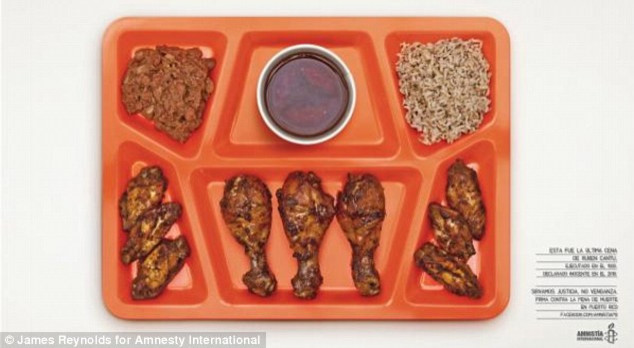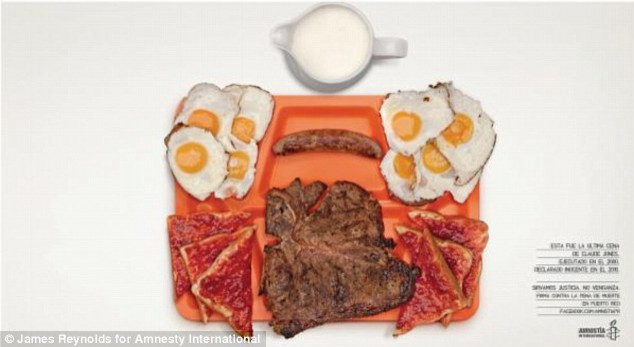The Last Meals Of Innocent Men: Amnesty International Highlights Steep Price Of Capital Punishment [PHOTOS]
An emotional new ad campaign from Amnesty International asks its viewers to stomach a hard truth -- images of the last meals of wrongly executed American prisoners.
As part of an initiative to abolish capital punishment completely, the influential human rights group has highlighted the unintended consequences of imposing the death penalty by focusing on a handful of prisoners who were eventually presumed innocent after they were executed. Since 1973, 142 death row inmates have been exonerated of the crimes for which they were sentenced to die, the Death Penalty Information Center reports. Some of those people spent decades in prison before their innocence was proven.
But that proof came too late for at least 10 of the more than 1,000 prisoners who have been executed in the U.S. during the past forty years, according to Amnesty International. The advertisements were sponsored by the organization's branch in Puerto Rico.
Death row inmates tend to ask for calorie-rich comfort foods for their final meal before death, according to an analysis of last meal requests from Cornell University. As depicted in the images below, fried foods, steak, soda and ice cream are commonly requested.
Seventeen states and the District of Columbia have banned capital punishment. Forty-three American prisoners were put to death in 2012. Almost one-third of those executions occurred in Texas.
Ruben Cantu (Texas)

Cantu was only 17 when he was charged with capital murder in Texas for the shooting death of a man during an attempted robbery. However, one key eyewitness who was wounded during the crime later said he was pressured by police to identify Cantu as the shooter. According to the Houston Chronicle, he later told police Cantu was not the assailant on two separate occasions.
Cantu was executed in 1993.
The Bexar County District Attorney who charged Cantu with capital murder eventually said he never should have sought the death penalty in a case based on the testimony of an eyewitness.
Claude Howard Jones (Texas)

Jones, who was sentenced to death in 1989 for the shooting death of a Texas liquor store owner, was executed in 2000. But recent DNA testing of a strand of hair found at the scene of the crime, the only physical evidence that placed him there, did not belong to Jones.
“Knowing that these DNA results support his innocence means so much to me, my son in the military and the rest of my family. I hope these results will serve as a wake-up call to everyone that serious problems exist in the criminal justice system that must be fixed if our society is to continue using the death penalty,” Jones’ son, Duane Jones, told the Texas Observer in 2010.
Leo Jones (Florida)

Jones, who was convicted of murdering a police officer in Florida, said he was coerced into signing an confession after several hours of police interrogation. The police officer who arrested him, as well as the detective who took his confession, were forced out of uniform for ethical violations a few years after Jones’ conviction. Jones was executed in 1998.
David Spence (Texas)

In 1984, Spence was sentenced to death for the murder of three Texas teenagers. However, no physical evidence connected him to the crime, and both the homicide detective who conducted the investigation, as well as the police lieutenant who supervised it, each said they did not believe Spence was the perpetrator.
The prosecution reportedly relied on the testimony of other prison inmates in their case against Spence, the Death Penalty Information Center reports. He was executed in 1997.
Cameron Willingham (Texas)

Willingham, who was convicted of murdering his three children in a 1991 house fire, was executed in Texas in 2004. Four national arson experts have concluded that the original investigation in the case was flawed, while an independent investigation into the case concluded that the prosecution centered its argument on arson theories that have since been repudiated by scientific studies.
© Copyright IBTimes 2024. All rights reserved.





















